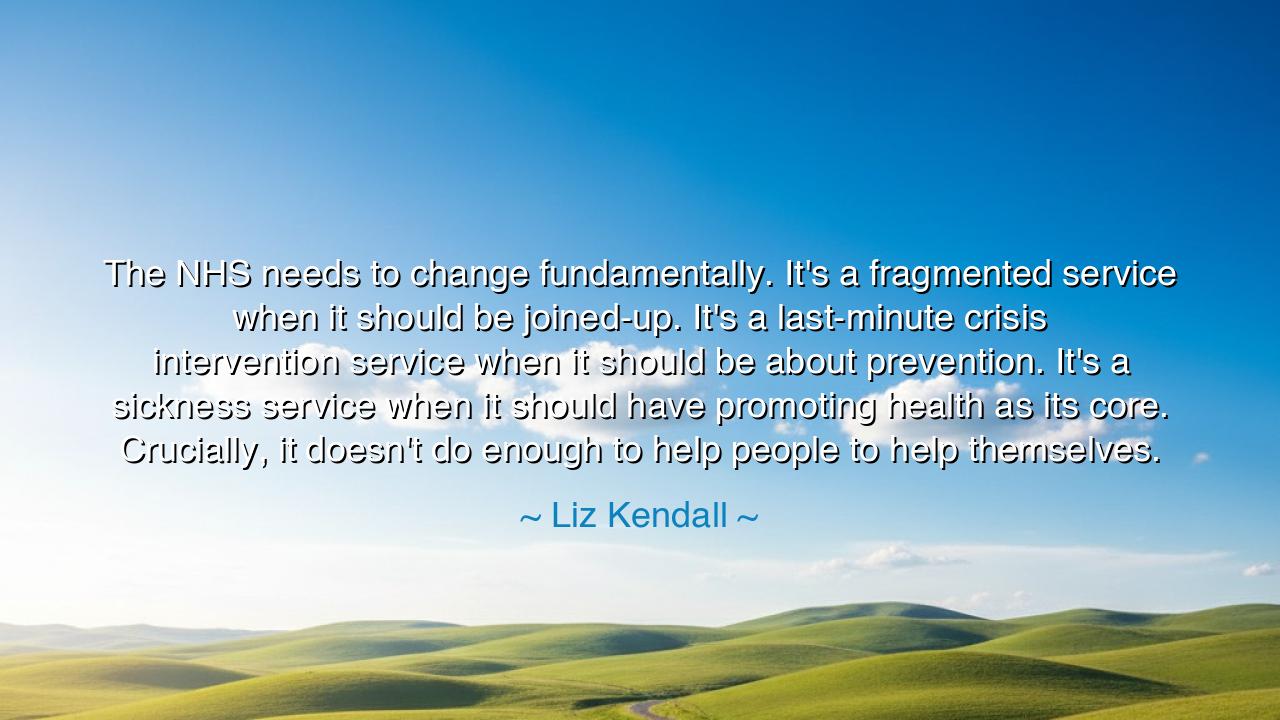
The NHS needs to change fundamentally. It's a fragmented service
The NHS needs to change fundamentally. It's a fragmented service when it should be joined-up. It's a last-minute crisis intervention service when it should be about prevention. It's a sickness service when it should have promoting health as its core. Crucially, it doesn't do enough to help people to help themselves.






The words of Liz Kendall rise like a call to awakening: “The NHS needs to change fundamentally. It’s a fragmented service when it should be joined-up. It’s a last-minute crisis intervention service when it should be about prevention. It’s a sickness service when it should have promoting health as its core. Crucially, it doesn’t do enough to help people to help themselves.” In these words, there is not only critique, but a vision—a vision as timeless as it is urgent. It is the voice of one who has seen a noble institution falter beneath its own weight, and who dreams of restoring it to harmony with its original purpose: to heal not just the broken body, but the very spirit of a nation.
In the days of old, the healers of every tribe understood a sacred truth: that the art of medicine begins long before sickness takes root. The wise would walk among the people, teaching them how to live in balance with nature, how to eat, how to breathe, how to rest. They did not wait for fever to rise or bones to break; they sought to prevent harm before it came. Yet in our age, Kendall reminds us that we have forgotten this ancient wisdom. The National Health Service, born of compassion and forged in the fires of equality after war, has become a temple of emergency, not of endurance. It waits for pain before it acts, when it could have sown the seeds of health long before illness appeared.
She speaks of fragmentation, and indeed, this is the curse of our age. When the mind of a nation is divided, so too are its institutions. One part heals the body, another tends the mind, another supports the spirit—yet they do not speak to one another. The ancient Greeks would have called this a tragedy of disunity. In the Asclepion, where pilgrims came for healing, body, mind, and soul were treated as one. The patient bathed in holy waters, dreamed in sacred sleep, and spoke to the priest-healer at dawn. They understood that to join-up the parts of care was to restore the wholeness of the human being. Kendall’s cry is for that same wholeness—a vision of health as harmony, not haste.
Think, for a moment, of the tale of Ignaz Semmelweis, the Hungarian doctor of the 19th century. In a time when infection was seen as a mystery of fate, he discovered that simple handwashing could save countless lives. Yet the world mocked him, and his wisdom was ignored. The hospitals of Europe remained temples of suffering, bound to the crisis intervention of the dying rather than the prevention of death. Only years later did the truth of his insight shine forth: that the greatest medicine is foresight. Kendall’s words echo this eternal truth—that we must not worship the cure when we could honor the prevention.
When she says that the NHS has become a sickness service, she speaks to a deeper ailment in the soul of modern civilization. We have come to define health as the absence of pain, not the presence of vitality. We have forgotten that to be truly well is not merely to avoid the doctor, but to thrive—to rise each morning with energy, to eat with gratitude, to move, to breathe, to laugh. The ancients knew this well. The Chinese masters of medicine spoke of the doctor who visited homes not when illness struck, but when the family was well—to guide them toward balance, to keep them from ever falling into decay. Promoting health, not repairing sickness, was their noble art.
Yet Kendall’s most powerful words come at the end: “It doesn’t do enough to help people to help themselves.” Here lies the root of all transformation. No system, however grand, can save those who have surrendered their own agency. In every heart, the will to heal must awaken. The body is a temple that responds not only to treatment, but to intention. The healer can only guide the hand that chooses to rise. It is not enough for the NHS—or any nation—to heal the people; the people must also learn to heal themselves. This is the wisdom of empowerment, of shared responsibility between healer and healed.
The lesson, then, is both ancient and eternal: health is not given, it is cultivated. Do not wait for crisis—build wellness in the calm. Do not rely on others for your healing—become your own steward. Let your life be one of balance, your habits a fortress against decay. Nourish the body with simplicity, the mind with clarity, and the heart with compassion. And when you meet others who falter, lift them up as brothers and sisters on the same path. For in a world where all learn to heal themselves, the healers are never overburdened.
So let us hear Kendall’s words not as condemnation, but as a call to rebirth—a renewal of that ancient covenant between care and community. The NHS was born to protect, but to truly evolve, it must also teach, connect, and inspire. And we, the people, must rise to meet it. For only when each person becomes both the keeper and the healer of their own body shall we see the dawn of true health—a health not of reaction, but of radiant, living harmony.






AAdministratorAdministrator
Welcome, honored guests. Please leave a comment, we will respond soon